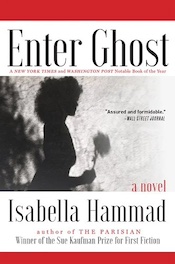|
Saturday finds us again!
The season is turning, though this week it felt more like turning back as we climbed back into the 70s. It has been, unfortunately, a season of waiting — at least here in the US — which makes it hard to focus on much except the looming events of politics. Hopefully what we've published this week can provide, if not a distraction, a different direction to look in and something else for your mind to turn over for a time.
On Monday, Elizabeth Smith reviewed The Inhabitants by Beth Castrodale (Regal House). Reviews editor Diane Josefowicz writes,
You might know Beth, who lives near Boston, as the writer behind Small Press Picks, a blog devoted to fiction from small presses, now in its 11th year. And of course Elizabeth is one of our regular writers; I'm looking forward to one more review from her this year.
And our featured story this week, the next in our month of Dangerous Creatures, was "The Woman in the Well" by Eman Quotah. We've previously published Eman's story "The Women Bury Qays Forever, as Told by My Grandmother" and some research notes for her novel Bride of the Sea. About this week's story, fiction editor Lacey Dunham writes,
In many horror narratives, two things uneasily co-exist: good and evil; the living and the dead; or, as in Eman Quotah's "The Woman in the Well," the past and the present. Modernity runs headlong into myth in Quotah's unsettling story where a man reporting a true crime segment discovers the consequences for failing to heed folkloric warnings.
Elsewhere, past contributor Sherrie Flick will give an online craft talk next month on "Depth of Field: Two Ways to Write Setting," for which you can register now. You can also read some of her thoughts on writing place in this recent essay.
Finally, I asked last week for brief reading recommendations of recent books you've been reading, and here's one from Eman Quotah:
 Isabella Hammad’s second novel, Enter Ghost, is not your usual “actors put on Shakespeare” story. These actors are acting in the West Bank, Hamlet is in Arabic, and the occupation army attends opening night. Shakespeare’s “genius” is not going to save anyone here, but art is still necessary. I read the novel alongside the author’s book-length craft essay, “Recognizing the Stranger: On Palestine and Narrative,” and both are deep, moving explorations of art and resistance in the context of Palestine. Isabella Hammad’s second novel, Enter Ghost, is not your usual “actors put on Shakespeare” story. These actors are acting in the West Bank, Hamlet is in Arabic, and the occupation army attends opening night. Shakespeare’s “genius” is not going to save anyone here, but art is still necessary. I read the novel alongside the author’s book-length craft essay, “Recognizing the Stranger: On Palestine and Narrative,” and both are deep, moving explorations of art and resistance in the context of Palestine.
More recommendations are welcome (and I have already received a couple of others that did not make it into the newsletter today but will soon).
Thanks for reading,
Steve Himmer
|